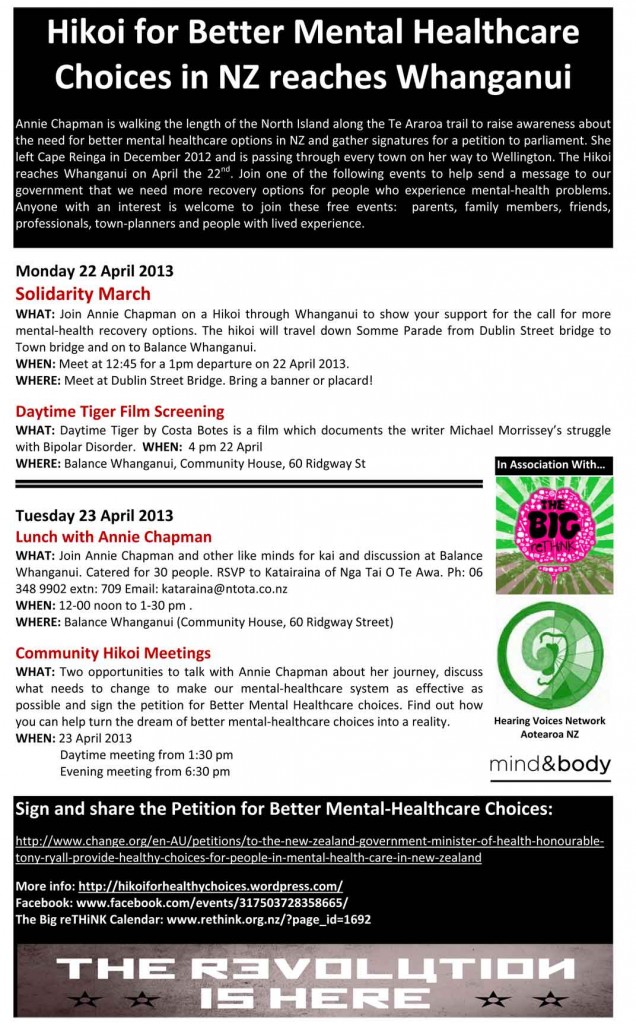Research article
Childhood clumsiness and peer victimization: a case–control study of psychiatric patients
Bejerot S, Humble MB
BMC Psychiatry 2013, 13:68 (25 February 2013)
[Provisional PDF]
Research article
A case-linkage study of crime victimisation in schizophrenia-spectrum disorders over a period of deinstitutionalisation
Short TB, Thomas S, Luebbers S, Mullen P, Ogloff JR
BMC Psychiatry 2013, 13:66 (20 February 2013)
[Provisional PDF]
* This study reports an increase in crime victimisation by people with schizophrenia spectrum disorders since services were moved to the community. It is the opinion of Engage Aotearoa that violence by people who are unwell is often due to a lack of responsive services and appropriate supports, rather than the mental-health condition itself. Stressed out family members and friends are not always the most appropriate supporters when things have reached crisis point. Voluntary respite services are highly restricted in accessibility. The current NZ system requires that someone has become a risk to themselves or others before acute services are provided. Crisis Team response times are renowned for being too long. This all creates space for escalation and victimisation before treatment and support can be accessed. This is a complex issue that extends well beyond mental-health problems themselves and reaches into the core of how we as a society support those who are experiencing a mental-health crisis.
Research article
Antipsychotic medications and cognitive functioning in bipolar disorder: moderating effects of COMT Val108/158 Met genotype
Arts B, Simons CJ, Drukker M, van Os J
BMC Psychiatry 2013, 13:63 (19 February 2013)
[Provisional PDF]
*Note: The results of this gene-environment study, if replicated, may partly explain why people with the same diagnosis can respond very differently to the same antipsychotic medication.
Research article
A 6-month randomized controlled trial to test the efficacy of a lifestyle intervention for weight gain management in schizophrenia
Attux C, Martini LC, Elkis H, Tamai S, Freirias A, Camargo Md, Mateus MD, Mari Jd, Reis AF, Bressan RA
BMC Psychiatry 2013, 13:60 (18 February 2013)
[Provisional PDF]
*Note: Weight management strategies are important interventions for addressing a common side-effect of many anti-psychotic and some antidepressant medications. However, in the opinion of Engage Aotearoa, this article de-emphasises the role of medications in the weight-gain of people with schizophrenia diagnoses and incorrectly implies it is a direct consequence of the mental-health problem itself, when it is not.
Research article
Perception of depressive symptoms by the Sardinian public: results of a population study
BMC Psychiatry 2013, 13:57 (16 February 2013)
[Provisional PDF]
*Note: These results show that the public sees a difference between depression as a response to loss (‘a normal response’) and clinical depression requiring professional attention. In the opinion of Engage Aotearoa, the public (and the authors) appear to assume that diagnosable mental-health problems are ‘not normal responses’. This is an attitude that likely contributes to stigma about depression. Unfortunately this article does not acknowledge that clinical depression is indeed a normal response that can usually also be traced to previous difficult experiences.
Research article
Substance use among inmates at the Eldoret prison in Western Kenya
Kinyanjui DW, Atwoli L
BMC Psychiatry 2013, 13:53 (13 February 2013)
[Provisional PDF]
Research article
Is virtual reality always an effective stressors for exposure treatments? Some insights from a controlled trial
Pallavicini F, Cipresso P, Raspelli S, Grassi A, Serino S, Vigna C, Triberti S, Villamira M, Gaggioli A, Riva G
BMC Psychiatry 2013, 13:52 (11 February 2013)
[Provisional PDF]
Research article
Residual symptoms and functioning in depression: does the type of residual symptom matter? a post-hoc analysis
Romera I, Pérez V, Ciudad A, Caballero L, Roca M, Polavieja P, Gilaberte I
BMC Psychiatry 2013, 13:51 (11 February 2013)
[Provisional PDF]
Research article
CBT for depression: a pilot RCT comparing mobile phone vs. computer
Watts S, Mackenzie A, Thomas C, Griskaitis A, Mewton L, Williams A, Andrews G
BMC Psychiatry 2013, 13:49 (7 February 2013)
[Provisional PDF]
Research article
Influence of personal and environmental factors on mental health in a sample of Austrian survivors of World War II with regard to PTSD: is it resilience?
Tran US, Glück TM, Lueger-Schuster B
BMC Psychiatry 2013, 13:47 (4 February 2013)
[Provisional PDF]
*Note: This research suggests a humorous and challenge-focused attitude to stress and trauma is associated with resilience to PTSD. Environmental elements showed associations with resilience to PTSD symptoms. The authors conclude the socio-environmental factors are simply consequences of PTSD symptoms. However, it is also possible that these factors are directly contributing to the symptoms and that resolving them would improve resilience to PTSD.







